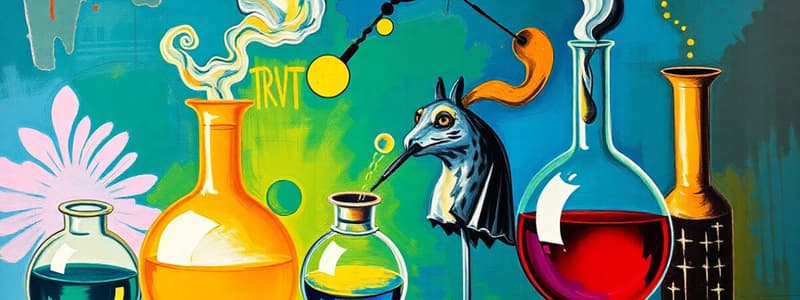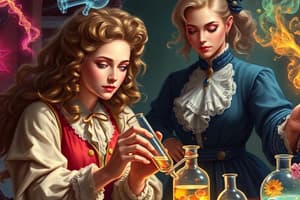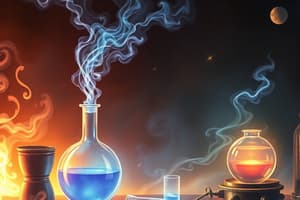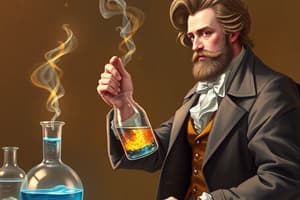Podcast
Questions and Answers
What is the next step in the scientific method after revising a hypothesis?
What is the next step in the scientific method after revising a hypothesis?
- Immediately upgrading the hypothesis to a law
- Testing the revised or new hypothesis and predicting a new experimental outcome (correct)
- Discarding the experiment
- Ignoring the hypothesis
What distinguishes a scientific theory from a hypothesis?
What distinguishes a scientific theory from a hypothesis?
- A theory is based on personal opinions.
- A theory is an untested guess.
- A theory is tested and confirmed by experiments under varied conditions without contradiction. (correct)
- A theory is a summary of a pattern of regularity detected in nature.
What is required for a scientific law to be classified as such?
What is required for a scientific law to be classified as such?
- It must have no exceptions. (correct)
- It must have exceptions.
- It must be widely believed.
- It must be based on opinion.
Through what method do modern scientists primarily communicate technical knowledge?
Through what method do modern scientists primarily communicate technical knowledge?
What is a central focus of chemistry?
What is a central focus of chemistry?
What are chemists investigating when they study chemical changes?
What are chemists investigating when they study chemical changes?
What is the focus of chemistry as a science?
What is the focus of chemistry as a science?
What is analytical chemistry concerned with?
What is analytical chemistry concerned with?
What defines a molecule, according to the text?
What defines a molecule, according to the text?
What area of study is biochemistry concerned with?
What area of study is biochemistry concerned with?
Which of the following is a key aspect of thinking like a chemist?
Which of the following is a key aspect of thinking like a chemist?
What does organic chemistry primarily study?
What does organic chemistry primarily study?
Who is known as the 'Father of modern chemistry'?
Who is known as the 'Father of modern chemistry'?
In what year was 'Traité Élémentaire de Chimie' published?
In what year was 'Traité Élémentaire de Chimie' published?
What should a student learning chemistry commit to?
What should a student learning chemistry commit to?
What should students commit to in order to improve their understanding of chemistry?
What should students commit to in order to improve their understanding of chemistry?
What is the purpose of target checks?
What is the purpose of target checks?
What did the phlogiston theory propose?
What did the phlogiston theory propose?
What does embracing multiple ways of knowing mean?
What does embracing multiple ways of knowing mean?
What did Lavoisier's experiments with phosphorus and mercury demonstrate?
What did Lavoisier's experiments with phosphorus and mercury demonstrate?
What happens when a substance burns, according to Lavoisier's findings?
What happens when a substance burns, according to Lavoisier's findings?
What is one way to actively engage with the material?
What is one way to actively engage with the material?
Which of the following is an important component of the scientific method?
Which of the following is an important component of the scientific method?
What is a hypothesis in the scientific method?
What is a hypothesis in the scientific method?
What is the correct order of steps when using the Scientific Method?
What is the correct order of steps when using the Scientific Method?
Why is looking at results of experiments reported by others an important part of planning a new experiment?
Why is looking at results of experiments reported by others an important part of planning a new experiment?
Which of the following is an example of an observation?
Which of the following is an example of an observation?
What happens to the weight of ash compared to the original phosphorus in Lavoisier's experiment?
What happens to the weight of ash compared to the original phosphorus in Lavoisier's experiment?
In the textbook, what is the goal of the 'Thinking About Your Thinking' feature?
In the textbook, what is the goal of the 'Thinking About Your Thinking' feature?
What is the purpose of the appendices in the chemistry textbook?
What is the purpose of the appendices in the chemistry textbook?
What is the fundamental unit of a pure substance that retains its identity?
What is the fundamental unit of a pure substance that retains its identity?
Who is credited as the 'Father of modern chemistry'?
Who is credited as the 'Father of modern chemistry'?
What did the phlogiston theory attempt to explain?
What did the phlogiston theory attempt to explain?
According to Lavoisier, what does a substance combine with when it burns?
According to Lavoisier, what does a substance combine with when it burns?
What happens to the weight of the remaining ash after phosphorus is burned, compared to the original phosphorus?
What happens to the weight of the remaining ash after phosphorus is burned, compared to the original phosphorus?
What is a hypothesis?
What is a hypothesis?
Which of the following is the first step in the scientific method?
Which of the following is the first step in the scientific method?
After burning in a closed container, what happens to the amount of air left?
After burning in a closed container, what happens to the amount of air left?
What is the purpose of testing a prediction in the scientific method?
What is the purpose of testing a prediction in the scientific method?
What is the initial step in enhancing your understanding of chemistry?
What is the initial step in enhancing your understanding of chemistry?
Which skill is vital to cultivate when studying chemistry?
Which skill is vital to cultivate when studying chemistry?
What should students do with feedback they receive in a chemistry course?
What should students do with feedback they receive in a chemistry course?
What follows after testing a revised hypothesis in the scientific method?
What follows after testing a revised hypothesis in the scientific method?
What kind of exercises can be found at the end of the chapters?
What kind of exercises can be found at the end of the chapters?
What is a key characteristic of a scientific law?
What is a key characteristic of a scientific law?
What is one component in the textbook designed to get you thinking?
What is one component in the textbook designed to get you thinking?
How do scientists typically share technical knowledge with each other?
How do scientists typically share technical knowledge with each other?
Which of the following is a primary focus in the study of chemistry?
Which of the following is a primary focus in the study of chemistry?
What resource is available at the end of the textbook?
What resource is available at the end of the textbook?
What is 'Learn It Now!'?
What is 'Learn It Now!'?
In chemical changes what do chemists investigate?
In chemical changes what do chemists investigate?
What type of analysis does analytical chemistry involve?
What type of analysis does analytical chemistry involve?
What is looked at when using the Scientific Method?
What is looked at when using the Scientific Method?
Which field of chemistry focuses primarily on substances that do not contain carbon?
Which field of chemistry focuses primarily on substances that do not contain carbon?
When planning a new experiment, is it important to look at results of experiments reported by others?
When planning a new experiment, is it important to look at results of experiments reported by others?
What is a recommended commitment for students to improve their understanding of chemistry?
What is a recommended commitment for students to improve their understanding of chemistry?
What type of category is this: 'A red gummi bear burns vigorously when it is dropped into molten potassium chlorate.'?
What type of category is this: 'A red gummi bear burns vigorously when it is dropped into molten potassium chlorate.'?
What is a 'theory' in the context of science?
What is a 'theory' in the context of science?
Which of the following overlaps with chemistry?
Which of the following overlaps with chemistry?
Flashcards
Scientific Theory
Scientific Theory
A tested and confirmed hypothesis, supported by experiments under varied conditions without contradiction.
Scientific Law
Scientific Law
A summary of a pattern of regularity detected in nature with no known exceptions. It predicts what will happen.
Scientific Communication
Scientific Communication
Scientists share findings through technical publications and conferences.
Chemistry
Chemistry
Signup and view all the flashcards
Analytical Chemistry
Analytical Chemistry
Signup and view all the flashcards
Biochemistry
Biochemistry
Signup and view all the flashcards
Organic Chemistry
Organic Chemistry
Signup and view all the flashcards
Inorganic Chemistry
Inorganic Chemistry
Signup and view all the flashcards
Physical Chemistry
Physical Chemistry
Signup and view all the flashcards
Learning Chemistry Effectively
Learning Chemistry Effectively
Signup and view all the flashcards
Molecule
Molecule
Signup and view all the flashcards
Antoine Lavoisier
Antoine Lavoisier
Signup and view all the flashcards
Phlogiston Theory
Phlogiston Theory
Signup and view all the flashcards
Lavoisier's Burning Experiments
Lavoisier's Burning Experiments
Signup and view all the flashcards
Hypothesis
Hypothesis
Signup and view all the flashcards
Observing
Observing
Signup and view all the flashcards
Being Skeptical
Being Skeptical
Signup and view all the flashcards
Predicting an Outcome
Predicting an Outcome
Signup and view all the flashcards
Testing the Prediction
Testing the Prediction
Signup and view all the flashcards
Commit to Improvement
Commit to Improvement
Signup and view all the flashcards
Think Like a Chemist
Think Like a Chemist
Signup and view all the flashcards
Think Conceptually
Think Conceptually
Signup and view all the flashcards
Embrace Multiple Ways of Knowing
Embrace Multiple Ways of Knowing
Signup and view all the flashcards
Develop Thinking Skills
Develop Thinking Skills
Signup and view all the flashcards
Utilize Feedback
Utilize Feedback
Signup and view all the flashcards
Reviewing Scientific Work
Reviewing Scientific Work
Signup and view all the flashcards
Ethical Experiment Planning
Ethical Experiment Planning
Signup and view all the flashcards
Observation
Observation
Signup and view all the flashcards
What is Chemistry?
What is Chemistry?
Signup and view all the flashcards
What is a Molecule?
What is a Molecule?
Signup and view all the flashcards
Traité Élémentaire de Chimie
Traité Élémentaire de Chimie
Signup and view all the flashcards
What is Phlogiston Theory?
What is Phlogiston Theory?
Signup and view all the flashcards
Lavoisier's Combustion Discovery
Lavoisier's Combustion Discovery
Signup and view all the flashcards
What is an Experiment?
What is an Experiment?
Signup and view all the flashcards
What is the Scientific Method?
What is the Scientific Method?
Signup and view all the flashcards
What is observing?
What is observing?
Signup and view all the flashcards
What is being skeptical?
What is being skeptical?
Signup and view all the flashcards
Feedback Loop
Feedback Loop
Signup and view all the flashcards
Thinking About Your Thinking
Thinking About Your Thinking
Signup and view all the flashcards
P/Review
P/Review
Signup and view all the flashcards
Revising a Hypothesis
Revising a Hypothesis
Signup and view all the flashcards
Predicting with a Hypothesis
Predicting with a Hypothesis
Signup and view all the flashcards
Upgrading to a Theory
Upgrading to a Theory
Signup and view all the flashcards
Scientific Theory (Model)
Scientific Theory (Model)
Signup and view all the flashcards
Energy in Chemical Changes
Energy in Chemical Changes
Signup and view all the flashcards
Chemistry: The Central Science
Chemistry: The Central Science
Signup and view all the flashcards
Goal of Learning Chemistry
Goal of Learning Chemistry
Signup and view all the flashcards
Learning Resources
Learning Resources
Signup and view all the flashcards
Study Notes
- Chemistry is the science concerned with the study of molecules and their behavior
- Molecules are the smallest units of a pure substance that can exist independently while retaining the substance's identity
Antoine Lavoisier
- Lavoisier's experiments included the burning of phosphorus and mercury
Beginning of Experimental Chemistry
- The original outdated Phlogiston theory states combustible matter contains phlogiston that is released upon burning
- Wood burning was thought to release phlogiston, leaving ash
The Scientific Method
- The scientific method involves observation, forming a tentative explanation known as a hypothesis, and being skeptical of the proposed hypothesis until it is tested to make predictions for outcomes and experimentation begins
- Testing the prediction is done by an experiment and analyzing results
- The hypothesis is either revised or upgraded based on the analysis
- A thoroughly tested and confirmed hypothesis is upgraded to a theory, also known as a scientific model
- A scientific law must have no exceptions to be classified as a scientific law
- Communication and technical knowledge are key for dissemination
Learning Chemistry
- Feedback loops are a method to continue learning from one's errors.
Textbook Features
- Section-by-Section Goals provide context to what should be learned based on section of text
- "Active Examples" provide examples of how you might actively think about answering the example questions on your own
- Target checks can be used to see if concepts are sinking in
- P/Review sections provide a review of the basics
- “Learn It Now!” sections reinforce critical concepts
- "Thinking About Your Thinking" sections help build critical thinking and learning skills for the field
Studying That Suits You
Use AI to generate personalized quizzes and flashcards to suit your learning preferences.



